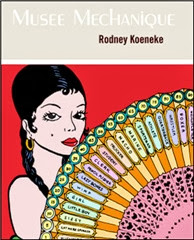Rob Fitterman’s reading in Portland two Saturdays back with Gale Czerski and Jared Hayes was a study in the divergent effects and intentions possible within a shared aesthetic of constrained or borrowed language. From Czerski’s variations on lines from Keats’s Endymion, through Hayes’s mashups of Tender Buttons with Spicer’s Language, to Fitterman’s deft sampling from the language of advertising, focus groups, and corporate cubespeak (“Why Dave felt like he had to cc everyone beats me”), their readings had me asking what it is poets are doing when they ‘write through’ the words of others, what it brings to their poems and what it implies about a poetics.
In Czerski’s case, the changes she rang on the sequence “sea/verge/starlight/hand” offered an intricate verbal patterning as an alternate—maybe competing—structural device to Keats’s end-stopped rhyme, while also suggesting structure itself as a subject of the poem. The longest poem she read, Invocation (due out this month from Sarah Mangold and Maryrose Larkin’s FLASH + CARD press), built out from the Keats piece by taking the periodic table of the elements, superstitions around the numbers 9 and 13, and (unless I misheard, though the title suggests it) the formulaic repetitions involved in prayer as images of the grids or constraints that so often seem to be a condition of being: “skin is an indictment,” “around the zero wound with losses.”
There was a tragic note in the poem, as if the act of invoking—of calling to be present—was also a kind of trapping, or a form of betrayal. The piece seemed stretched between a desire to call something into being and a recognition of how presence entails being fixed in a system (the body, numerical sequence, grammar) that distorts the one recalled (“so good to see a version of you.”) Listening to the poem the way Czerski asked us to—“close your eyes, and don’t look any one place”—I thought of those early zombie movies where the scientist tries to resurrect a dead loved one, only to discover a faulty clone of a former self: all skin and zeros, no soul. Invocation seems especially alive to that dilemma; the most powerful part of the poem for me was an incantatory set of negations (untether/unbound/untie/unleash) that implied freedom rather than fixity, a moving release from “history’s melancholy tears by necessity.”
8 hours ago





No comments:
Post a Comment